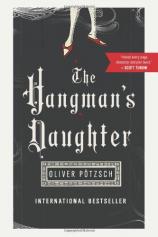Excerpt
Excerpt
The Hangman's Daughter

Schnogau
October 12, A.D. 1624
October 12 was a good day for killing. It had rained all week, but on this Friday, after the church fair, our good Lord was in a kindlier mood. Though autumn had already come, the sun was shining brightly on that part of Bavaria they call the Pfaffenwinkel --- the priests’ corner—and merry noise and laughter could be heard from the town. Drums rumbled, cymbals clanged, and somewhere a fiddle was playing. The aroma of deep-fried doughnuts and roasted meat drifted down to the foul-smelling tanners’ quarter.
Yes, it was going to be a lovely execution.
Jakob Kuisl was standing in the main room, which was bathed in light, trying to wake up his father. The bailiff had called on them twice already, and there was no way he’d be able to send him away a third time. The hangman of Schongau sat bent over, his head lying on a table and his long straggly hair floating in a puddle of beer and cheap brandy. He was snoring, and at times he made twitching movements in his sleep.
Jakob bent down to his father’s ear. He smelled a mix of alcohol and sweat. The sweat of fear. His father always smelled like that before executions. A moderate drinker otherwise, he began to drink heavily as soon as the death sentence had been pronounced. He didn’t eat; he hardly talked. At night he often woke up screaming and drenched in perspiration. The two days immediately before the execution there was no use talking to him. Katharina, his wife, knew that and would move to her sister-inlaw’s with the children. Jakob, however, had to stay behind, as he was his father’s eldest son and apprentice.
“We’ve got to go! The bailiff’s waiting.”
Jakob whispered at first, then he talked louder, and by now he was screaming. Finally the snoring colossus stirred.
Johannes Kuisl stared at his son with bloodshot eyes. His skin was the color of old, crusty bread dough; his black, straggly beard was still sticky with last night’s barley broth. He rubbed his face with his long, almost clawlike fi ngers. Then he rose to his full height of almost six feet. His huge body swayed, and it seemed for a moment that he’d fall over again. Then, however, Johannes Kuisl found his balance and stood up straight.
Jakob handed his father his stained overcoat, the leather cape for his shoulders, and his gloves. Slowly the huge man got dressed and wiped the hair from his forehead. Then, without a word, he walked to the far end of the room. There, between the battered kitchen bench and the house altar with its crucifi x and dried roses, stood his hangman’s sword. It measured over two arm’s lengths and it had a short crossguard, and though it had no point, its edge was sharp enough to cut a hair in midair. No one could say how old it was. Father sharpened it regularly, and it sparkled in the sun as if it had been forged only yesterday. Before it was Johannes Kuisl’s, it had belonged to his father-in-law Jörg Abriel, and to his father and his grandfather before that. Someday, it would be Jakob’s.
Outside the door the bailiff was waiting, a small, slight man who kept turning his head toward the town walls. They were late as it was, and some in the crowd were probably getting impatient now.
“Get the wagon ready, Jakob.”
His father’s voice was calm and deep. The crying and sobbing of last night had disappeared as if by magic.
As Johannes Kuisl shoved his heavy frame through the low wooden doorway, the bailiff instinctively stepped back and crossed himself. Nobody in the town liked to meet the hangman. No wonder his house was outside the walls, in the tanners’ quarter. When the huge man came to the inn for wine, he sat alone at the table in silence. People avoided his eyes in the street. They said it meant bad luck, especially on execution days. The leather gloves he was wearing today would be burned after the execution.
The hangman sat down on the bench in front of his house to enjoy the midday sun. Anyone seeing him now would hardly believe that he was the same man who had been deliriously babbling not an hour before. Johannes Kuisl had a good reputation as an executioner. Fast, strong, never hesitating. Nobody outside his family knew how much drink he used to down before executions. Now he had his eyes closed, as if he were listening to a distant tune. The noise from the town was still in the air. Music, laughter, a blackbird singing nearby.
The sword was leaning against the bench, like a walking stick.
“Remember the ropes,” the hangman called to his son without so much as opening his eyes.
In the stable, which was built onto the house, Jakob harnessed the thin, bony horse and hitched it to the wagon. Yesterday he had spent hours scrubbing the two-wheeled vehicle. Now he realized that it had all been in vain. Dirt and blood were eating into the wood. Jakob threw some straw on the filthiest spots, then the wagon was ready for the big day.
The Hangman's Daughter
- Genres: Fiction, Historical Fiction
- paperback: 448 pages
- Publisher: Mariner Books
- ISBN-10: 054774501X
- ISBN-13: 9780547745015




